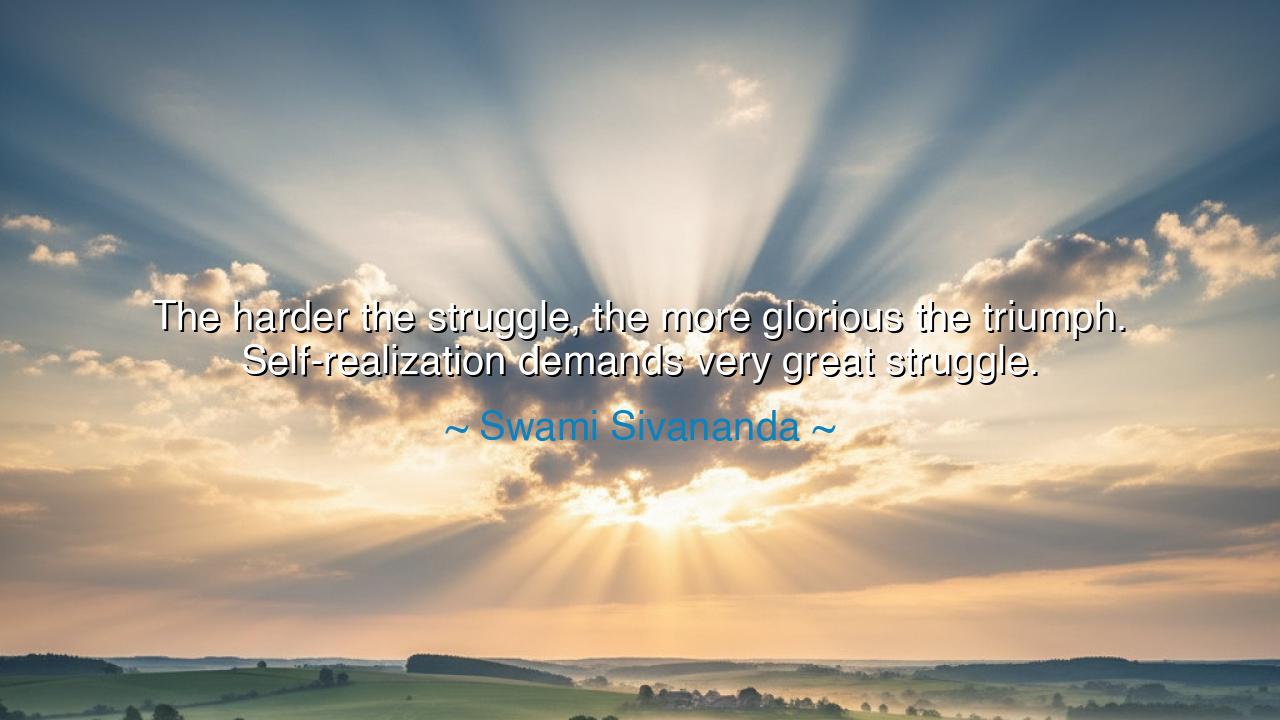
The harder the struggle, the more glorious the triumph.
The harder the struggle, the more glorious the triumph. Self-realization demands very great struggle.






Hearken, O seekers of wisdom, to the profound words of Swami Sivananda, who declared: “The harder the struggle, the more glorious the triumph. Self-realization demands very great struggle.” In these words lies a meditation upon effort, endurance, and the sacred journey toward awakening and mastery of the self. Sivananda reminds us that the path to enlightenment, virtue, or personal excellence is never easy; it is forged through trials, perseverance, and the courage to confront obstacles both external and within the soul itself.
From the earliest civilizations, sages understood that the value of triumph is measured by the difficulty of the path. In the epics of Greece, heroes such as Odysseus endured storms, monsters, and trials of cunning and endurance before returning home. The sweetness of victory, the glory of reunion, and the recognition of self-mastery were all amplified because of the magnitude of the struggle endured. Sivananda echoes this ancient principle: without labor and challenge, triumph is hollow, and self-realization remains distant.
The quote also illuminates the intimate connection between struggle and inner transformation. It is not merely the external achievement that matters, but the growth of character, fortitude, and discernment that accompanies hardship. Consider the life of Abraham Lincoln, who faced repeated failures, personal loss, and political setbacks before rising to guide a nation through its darkest hour. The very struggles that might have crushed a lesser soul became the crucible in which his wisdom, patience, and resolve were tempered, illustrating Sivananda’s teaching that difficulty is the forge of greatness.
Sivananda’s words further teach that self-realization — the understanding of one’s true nature and potential — demands confrontation with the deepest challenges within oneself. Pride, fear, ignorance, and desire are not vanquished easily. Like a warrior facing an unseen foe, the seeker must labor tirelessly, cultivate discipline, and embrace discomfort. In this, the spiritual and the practical converge: every meaningful victory requires effort that tests mind, body, and spirit.
History provides countless exemplars of this truth. Mahatma Gandhi, through decades of personal discipline, nonviolent resistance, and enduring hardship, achieved moral triumph over oppression. The struggle was immense, often perilous, and yet it magnified the glory of the outcome — freedom and justice — both for himself and for millions. Sivananda’s aphorism reminds us that the depth of struggle is inseparable from the magnitude of triumph, and that effort amplifies the significance of achievement.
From this reflection emerges a timeless lesson: embrace the challenges of life as teachers, rather than obstacles. Understand that struggle is the crucible in which virtues are honed, ambitions are tested, and self-realization is approached. The more formidable the trials, the more profound the growth, and the more luminous the triumph. In every trial lies the potential for inner awakening and lasting glory.
Practical counsel flows naturally: confront difficulties with courage, discipline, and patience. Seek challenges that stretch your abilities, confront your fears, and illuminate your weaknesses. Persist when the path is arduous, and view each obstacle as a teacher guiding you toward the realization of your full potential. In this way, effort becomes sacred, struggle becomes meaningful, and triumph becomes luminous.
Thus, O listener, let the words of Swami Sivananda illuminate your path: the trials you face are not punishments, but gateways to growth. The harder the struggle, the more glorious the triumph. Persist with diligence, cultivate self-discipline, and confront the depths of your own being, for it is through great struggle that one achieves true self-realization, mastery, and enduring greatness.






AAdministratorAdministrator
Welcome, honored guests. Please leave a comment, we will respond soon